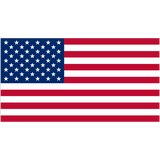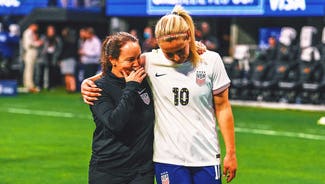





































































































































Mary Harvey goes from soccer champ to human rights leader
Mary Harvey is used to blazing the trail in sports.
Despite growing up without major soccer tournaments to aspire to play in, the goalkeeper helped the U.S. win the inaugural Women's World Cup in 1991 and the first women's Olympic soccer title five years later.
"As a women's national team, we didn't set out to have wide scale impact, but we did," Harvey recalled in an interview with The Associated Press. "From that I learned that that's what I wanted my life to be about: the ability to impact others in a positive way."
Today, that desire has made her one of the biggest campaigners for human rights through sports.
After starting her career as a consultant in the private sector, Harvey led development work at FIFA from 2003-08, helping formulate a human rights strategy for the successful 2026 World Cup bid by the United States, Canada and Mexico. Now Harvey will be taking that strategy global by heading a new sports human rights watchdog.
"The language of human rights it not certainly the language of sport," Harvey said. "So I went through that personally and learned it (for the World Cup bid) and so I think the center has an opportunity to provide that."
Harvey is preparing to move to Switzerland from the United States to serve as chief executive of the Centre for Sport and Human Rights, hoping governing bodies adopt some of FIFA's newfound commitment to making compliance on labor and discrimination issues central to whether a country can host a major event.
The game-changer was Qatar winning the vote to host the 2022 World Cup and the subsequent focus on labor conditions for migrant workers, which led to the energy-rich nation being compelled to provide greater protections. FIFA made bidders for the 2026 edition own up to their human rights risks and present a means of tackling them ahead of the vote this year.
FIFA serves on the Centre for Sport and Human Rights' advisory board among 41 organizations across sports, along with sponsors such as Coca-Cola and Visa.
"In the future if people are bidding and they're less than aggressive with what they want to do on the human right side, with maybe a smart box-ticking exercise," Harvey said. "There should be accountability for that."
It's about leveraging the power of a country chasing a mega sports event to encourage changes.
"This isn't a panacea for nation building," Harvey said. "We can exert influence."
That is necessary beyond major events, or high-profile teams.
Afghan authorities suspended the head of the soccer federation and other officials this month after media revelations of allegations of sexual and physical abuse of female players. Harvey hopes the Centre for Sport and Human Rights can be an outlet for athletes, officials or workers around sport to report wrongdoing and have their safety protected.
"Human rights defenders are targets," Harvey said.
However, the center still requires investment, she added.
"We can't operate with any sort of fear of what we say or do and how that affects funding," Harvey said by telephone. "We have to be able to operate independently and provide a free service."
The center was launched in June and is chaired by former Irish President Mary Robinson, who has also served as UN High Commissioner for Human Rights.
"We need to bring human rights more centrally into sport and make people involved in sport realize that they have to take responsibility and they have to work on many issues at so many different levels from the big stadiums to discrimination or racism or trafficking," Robinson told the AP.
Using the center's status, Robinson will be looking to secure greater protections for local communities impacted by sports events — such as the traders forced to close their stalls near World Cup venues, as Robinson complained to FIFA about during the 2010 World Cup in South Africa and 2014 edition in Brazil.
"I hope they won't exclude those who you know could actually improve their living by being able to trade around the stadiums and get the footfall on big occasions," Robinson said.
There are also concerns about how free labor can be relied on to operate events.
"Volunteers can play a role," Robinson said, "but not if it displaces the potential for people having jobs where the entities can well afford to give people the opportunity to have gainful employment rather than work as volunteers."

